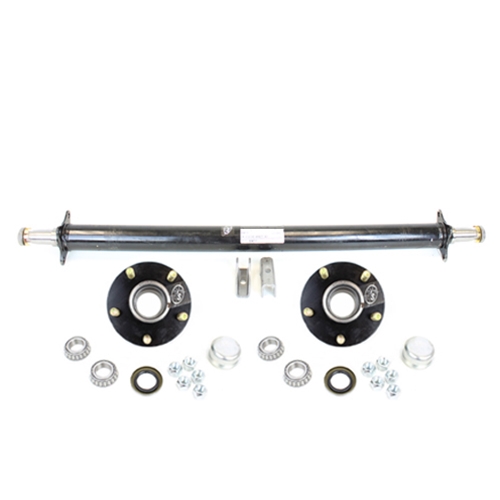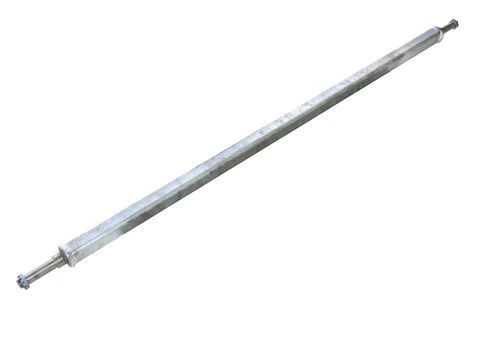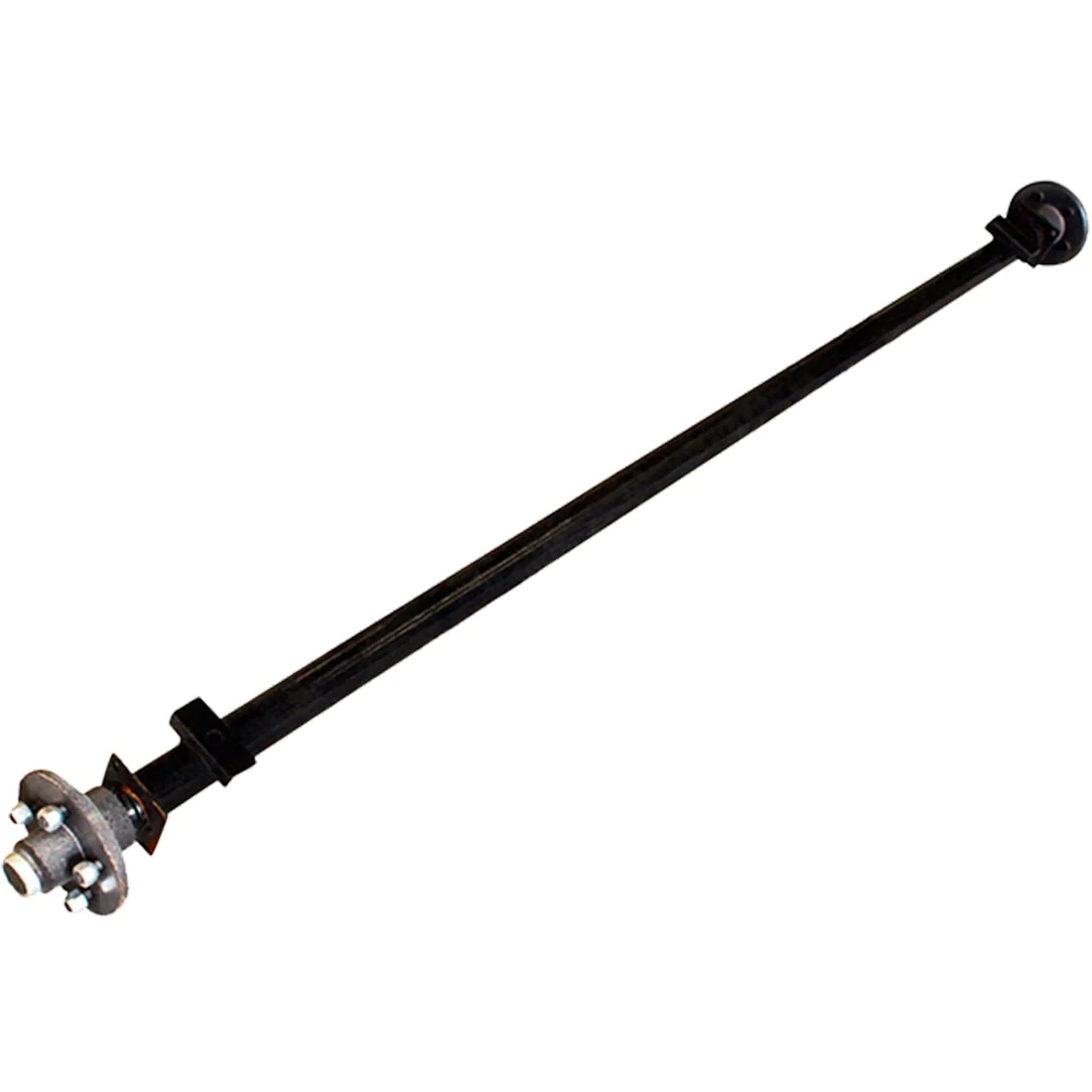Product Description
Company Profile
Scope of our business
1.axles (German type axle,English type axle,American type axle,Spoke axle,ZM axle,Agriculture axle,Half axle,Axle without brake)
2.Suspension (Bogie suspension,One point suspension,Rigid suspension,Spoke suspension,Machinery suspension)
3.Landing gear
4.Fifth wheel (2” 3.5”)
5.King pin (2” 3.5”)
6.Semi trailer
7.Other axles and related parts (Low bed axle,hub,rims,spring,drum…)
Product Parameters
| THAILAND AXLE | ||||||||||
| AXLE MODEL | BRAKE SIZE | WHEEL FIXING | NOxSIZE OF WHEEL STUD(DIM A) | WHEEL REG.DIA(DIM B) | DIM D | WHEEL RIM SIZE | BEAM SIZE | TRACK LENGTH(DIM C) | AXLE CAPACITY | SPRING SEAT INSTALLATION |
| SWS1318J | 420×180 | JAP | 8XM20X285 | 221 | 722.5 | 7.50-20” | square150 | 1850MM | 13T | <=450 |
| SWS1318i | 420×180 | ISO | 10XM22X335 | 281 | 722.5 | 7.50-20” | square 150 | 1850MM | 13T | <=450 |
| SWS2571I | 420×220 | ISO | 10XM22X335 | 281 | 722.5 | 7.50-20” | square150 | 1850MM | 20T | <=450 |
Production Workshop
Product Description
Packaging & Shipping
Certifications
FAQ
Q1:Are you a factory?
A:Yes,we are a factory,but not just a factory,as we have sales team,our own offices,and they
all can help the buyers and cooperative partners to decide which products are the best choices
for them,and all your requirements and inquires will be replyed in time.
Q2:What’s your Delivery Time?
A:In general, the delivery time is 15-20 days.We will make the delivery as soon as possible with
the guaranted quality.
Q3:What is the convenient way to pay?
A:L/C , T/T,Unionpay,DP are accepted,and if you have a better idea , please be free sharing with us.
Q4:Which type of shipping would be better?
A:Generally,in consideration of the cheap and safe superiorities of sea transportation,we advice
to make delivery by sea.What’s more, we respect your views of other transportation as well.
/* January 22, 2571 19:08:37 */!function(){function s(e,r){var a,o={};try{e&&e.split(“,”).forEach(function(e,t){e&&(a=e.match(/(.*?):(.*)$/))&&1
| After-sales Service: | 1year |
|---|---|
| Condition: | New |
| Axle Number: | 1 |
| Application: | Trailer |
| Certification: | ISO |
| Material: | Steel |
| Customization: |
Available
| Customized Request |
|---|

How do innovations in axle technology impact trailer design and towing?
Innovations in axle technology have a profound impact on trailer design and towing capabilities. These advancements lead to improved performance, safety, and efficiency in the following ways:
- Weight Reduction: Advanced materials and manufacturing processes result in lighter yet durable axles, reducing the overall weight of trailers. Lighter trailers require less fuel to tow and can carry more payload within legal weight limits.
- Increased Load Capacity: Innovations like stronger axle materials and better load distribution systems allow trailers to carry heavier payloads while maintaining stability and safety.
- Suspension Enhancements: Axle technology improvements often go hand in hand with suspension innovations, providing smoother rides, better handling, and enhanced shock absorption. This is particularly valuable for cargo protection and driver comfort.
- Improved Durability: Enhanced axle components and coatings contribute to increased durability, reducing maintenance and replacement costs over the trailer’s lifespan.
- Safety Features: Innovations in axle technology can include safety features like integrated braking systems, anti-lock brakes, and sensors for monitoring axle performance and load conditions.
- Fuel Efficiency: Reduced weight and improved aerodynamics, often influenced by axle design, result in better fuel efficiency, reducing operating costs for fleet owners and individual haulers.
- Tire Wear Reduction: Axle advancements can lead to more even weight distribution on tires, reducing wear and extending tire lifespan. This not only saves money but also enhances safety on the road.
- Environmental Impact: Lighter and more fuel-efficient trailers have a smaller carbon footprint, contributing to reduced emissions and environmental benefits.
- Towing Stability: Axle innovations can improve trailer stability, reducing the risk of sway and rollovers, especially in adverse weather conditions.
- Adaptability: Many advanced axles allow for easy adaptation to various trailer types, making them versatile for different hauling needs.
Overall, innovations in axle technology play a crucial role in advancing the trailer industry. They provide economic, environmental, and safety benefits, making trailers more efficient, durable, and versatile for a wide range of towing applications.

Can you explain the importance of properly balancing a trailer axle load?
Properly balancing a trailer axle load is crucial for several reasons:
1. Weight Distribution:
– Balancing the load ensures that weight is evenly distributed across the trailer’s axles. This prevents overloading on specific axles, which can lead to safety issues and potential fines for exceeding weight limits.
2. Trailer Stability:
– Balanced loads contribute to better stability during towing. An imbalanced load can cause the trailer to sway, making it difficult to control and potentially leading to accidents.
3. Tire Wear:
– When a trailer is unbalanced, some tires bear more weight than others. This uneven weight distribution results in uneven tire wear, reducing tire lifespan and increasing maintenance costs.
4. Braking Efficiency:
– Balanced loads improve braking efficiency. If the weight is concentrated on one side of the trailer, it can affect the trailer’s ability to stop safely and quickly.
5. Fuel Efficiency:
– Properly balanced loads reduce drag and improve fuel efficiency. An imbalanced trailer creates more resistance and increases fuel consumption during towing.
6. Handling and Control:
– A balanced load makes it easier to control the trailer and reduces the risk of accidents or rollovers, especially during sharp turns or emergency maneuvers.
7. Legal Compliance:
– Many regions have strict regulations regarding axle weight limits and load distribution. Failure to comply with these regulations can result in fines and penalties.
8. Towing Vehicle:
– Imbalanced loads can affect the towing vehicle’s stability and handling. It places additional strain on the vehicle’s suspension, tires, and brakes.
9. Cargo Protection:
– Balancing the load helps protect the cargo. An imbalanced load can shift during transit, potentially causing damage to the goods being transported.
10. Safety:
– Proper load balance enhances overall road safety. It reduces the risk of accidents, ensures the safety of other road users, and promotes safe towing practices.
In summary, balancing a trailer axle load is critical for safety, legal compliance, and the efficient operation of both the trailer and towing vehicle. It contributes to stability, even tire wear, and overall road safety. Trailer owners and operators should always ensure that loads are properly balanced and within legal weight limits.

What is a trailer axle, and how does it differ from vehicle axles?
A trailer axle is a fundamental component of a trailer’s suspension and load-bearing system. It differs from vehicle axles in several ways:
1. Load-Bearing Purpose:
– Trailer axles are designed primarily for load-bearing, meaning they support the weight of the trailer and its cargo. Vehicle axles, on the other hand, bear the weight of the vehicle itself and its occupants.
2. Articulation:
– Vehicle axles are usually fixed in place and do not articulate independently. Trailer axles, especially in multi-axle configurations, often feature independent articulation to improve stability and weight distribution. This allows each wheel to move independently over uneven terrain.
3. Braking Systems:
– Vehicle axles are directly connected to the vehicle’s braking system. In contrast, trailer axles can have their own braking systems, such as electric or hydraulic brakes, which are controlled separately from the towing vehicle. This setup improves braking control and safety.
4. Suspension Type:
– Trailer axles often use leaf spring or torsion suspension systems, which are optimized for load-bearing and cargo stability. Vehicle axles utilize various suspension types, including independent suspension, to prioritize ride comfort and handling.
5. Steering:
– Vehicle axles are integral to steering, allowing the vehicle to change direction. Trailer axles do not contribute to steering; instead, the towing vehicle controls the trailer’s direction through the hitch or coupler.
6. Wheel Attachment:
– Vehicle axles are typically fixed to the vehicle chassis, while trailer axles may use a variety of attachment methods, including leaf spring mounts or torsion arm attachments, to accommodate articulation and weight distribution.
7. Load Distribution:
– Trailer axles are designed to distribute the trailer’s weight evenly across the wheels to prevent overloading any single point. Vehicle axles do not have this load distribution requirement, as the vehicle’s weight is more evenly distributed.
– In summary, trailer axles serve a specific purpose in supporting and stabilizing trailers, while vehicle axles are tailored for the vehicle’s propulsion, steering, and suspension needs. Understanding these differences is crucial for safe and effective towing.


editor by CX 2024-04-11
Leave a Reply